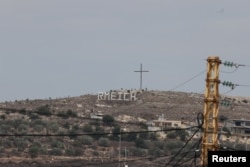As the Lebanese Christian village of Ramesh celebrates its first Easter since the start of the Gaza war, residents say parallel confrontations between Hezbollah and Israel are dragging them into a conflict they have no choice in.
Like many Christians elsewhere in southern Lebanon, residents are angry and worried that their homes could be caught in the crossfire and their families forced to permanently flee their ancestral villages near the Lebanese-Israeli border.
Earlier this week, a Ramesh resident encountered a group of armed men who tried to fire rockets into Israel from inside the village. Some villagers rang church bells to raise the alarm, while armed men fired rockets from another community, according to Mayor Milad Alam and residents of Ramesh.
“What we have been saying for the past six months is: stay neutral in our own homes. Any strike will bring huge losses,” Alam told Reuters.
Hezbollah began firing rockets into Israel from mountaintops and villages in southern Lebanon on October 8 in support of its Palestinian ally Hamas. Hamas carried out a cross-border attack on Israel the day before, triggering a fierce offensive against Israel by land, sea and air. Gaza Strip.
The villagers’ dissatisfaction reflects criticism from Christian clerics and politicians opposed to Hezbollah, who have long accused the group of undermining the country by possessing an arsenal of weapons controversially larger than the country’s military and monopolizing decisions on war and peace.
“We have nothing to do with this war. Do they (Hezbollah) want to replace us?” said a 40-year-old Lemesh resident who requested anonymity, fearing possible reprisals for criticizing Hezbollah. Iran-backed Hezbollah, which has influence in much of Lebanon, denies that its fighters tried to fire rockets from Ramesh.
In tiny Lebanon, more than a dozen sects coexist in a precarious balance, reflected in a power-sharing system that reserves government positions along religious lines. The president and central bank governor – the two top positions reserved for Maronite Christians – have been vacant since October 2022 and July 2023 respectively due to disagreements over the choice of successors.
“No say” in the system
Hundreds of thousands of Lebanese have been displaced internally and abroad by conflict and suffering over the last century, and the sect says a 15-year civil war has resulted in killings and kidnappings. About 90,000 people have been displaced in southern Lebanon since the conflict broke out in October.
Ghada Ayoub, a Christian lawmaker from the anti-Hezbollah Lebanese Forces party who represents a southern constituency, told Reuters that Christians stood up to Hezbollah “because it is encroaching on their presence” and the war is deepening the rift in Lebanon. Lebanese politics.
“The question now is: Is there any common ground that can continue – that we can use to build a country?” she said.
The area most affected by the shelling was the border zone, home to about a dozen Christian villages, including Ramesh. They sit on rolling hills and are covered with olive groves, pine trees and tobacco fields – now too dangerous to plant or harvest due to shelling.
“The area around us is really affected, with strikes happening 500, 600 meters away,” said Joseph Salameh, a local official in the town of Kraya, about 4 kilometers (2.5 miles) from Lebanon’s southern border. The harvest was ruined.” .
Lebanon has been hit hard by the financial crisis that began in 2019. As tourists stay away from the blasts, shops close and schools close or provide shelter to thousands displaced by the fighting, southern villages dominated by Shia Muslims face another severe economic crisis. The attack triggered local concerns about the exodus of Christians.
“Now the war has exacerbated this situation and encouraged our children to leave… Christians can no longer take on more than others because the country already has too many problems,” Salameh said.
Lebanon’s top Christian clergy also sounded the alarm in weekly sermons. Maronite Patriarch Boutros Rai called on Lebanon to stand aside in the early days of the Gaza war and more recently said the war was “imposed” on Christians.
Outcry grows
Beirut Greek Orthodox Metropolitan Elias Oddi asked earlier this month whether it was fair for “a faction in Lebanon to make decisions on behalf of everyone and make unilateral decisions that not all Lebanese agree with.”
As protests grew, Hezbollah’s main Christian ally, the Free Patriotic Movement, even stepped up its criticism, saying its nearly two-year alliance with Hezbollah had “shaken.”
“The main problem that has arisen recently is overstepping the boundaries of defending Lebanon and getting involved in a conflict that we cannot decide on,” said FPM chief Gebran Bassil.
Their alliance has provided Hezbollah with supporters from religious groups outside its traditional base, but the two have disagreed over the past two years on several issues, including who should be Lebanon’s next president.
Michael Young of the Carnegie Middle East Center said Basil’s comments were an attempt to exert influence over Hezbollah by driving a wedge but also reflected Christian unease with the status quo.
“The sentiment among the Christian community is almost a psychological separation from the system. They feel they have no say in the system, and to some extent that’s true – Hezbollah controls large parts of the system,” Yang told reporters . Reuters.
Follow us on Google news ,Twitter , and Join Whatsapp Group of thelocalreport.in
